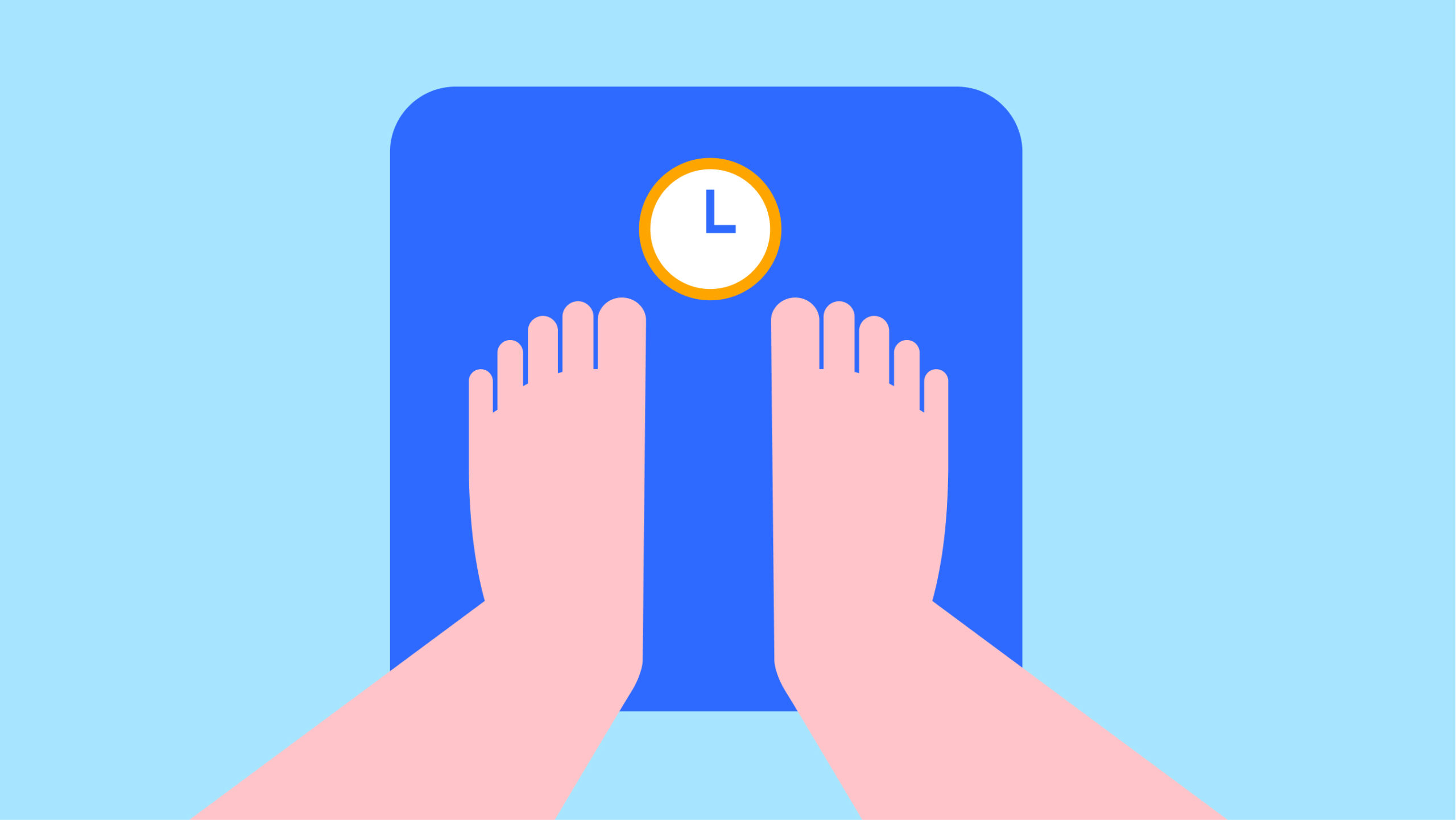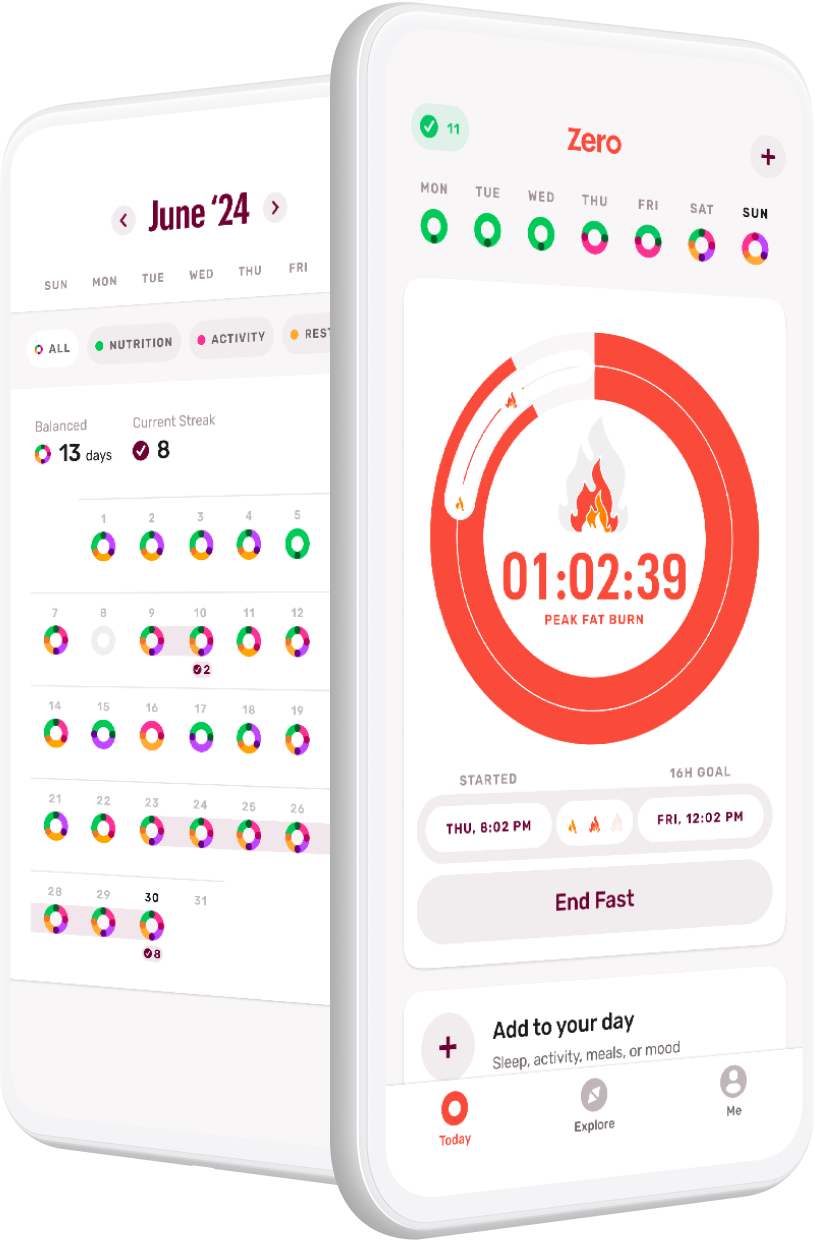Written and medically reviewed by Nicole Grant, RD
Intermittent fasting can be a great tool for weight loss. It’s a simple approach that tends to work because it limits how much you’re eating by keeping a set timeframe on when you’re eating.
While many people have found success with intermittent fasting, some find they are not losing the weight they anticipated. Read on to discover why you might not be seeing as much weight loss as you had hoped and what you can do to overcome these potential obstacles.

10 Reasons Why You’re Not Losing Weight Intermittent Fasting
#1. You’re Following the Wrong Intermittent-Fasting Plan
There’s more than one approach to intermittent fasting. Time-restricted feeding protocols can vary, ranging from 12 to 23 hours of fasting per day. Alternate-day fasting plans follow an eat–restrict–eat pattern, in which one day you fast or significantly restrict your calories, and the next day you revert your food intake back to normal. In addition, extended or prolonged fasts can last multiple days.
So, how do you know if your intermittent-fasting plan is right for you? Consider the following questions:
- Are you unhappy with the weight loss results you’re seeing?
- Are you ravenously hungry most days?
- Are you constantly breaking your fast early or inconsistently sticking to the planned protocol?
- Are you having excessive symptoms such as nausea, dizziness, or lightheadedness since starting your intermittent fasting routine?
If you answered “yes” to any of these questions, it may be a sign to change up your plan. You may need a longer or shorter eating window, or you may want to try out a new protocol entirely.
#2. You’re Eating Too Much (or Not Enough) During Your Eating Window
Your body tends to prefer a certain range of calories. Going too far above or below that range too often and/or for too long can lead to challenges maintaining a healthy weight (including weight gain). It can also create metabolic issues and increase your risk of chronic disease.
One of the reasons people see weight loss results with intermittent fasting is because reducing the amount of time spent eating typically reduces the overall calories you consume. However, it is still possible to overeat during your eating window and consume more calories than your body needs.
On the other hand, severe caloric restriction can also impact your ability to lose weight. A consistent reduction of 40–50% of your normal caloric intake can cause your metabolic rate to slow down and your body to conserve energy. This means that your body is burning fewer calories at rest. If you continue to eat the same number of calories but your body is burning less, this can also lead to a weight-loss plateau.
Therefore, work on finding the happy middle ground for caloric intake. Your specific caloric needs depend on a variety of factors such as age, sex at birth, weight, metabolic health, and activity levels, so the actual number will vary from person to person. However, a common technique used to figure out your caloric range involves calculating your total daily energy expenditure and subtracting 200–500 calories per day for weight loss.
#3. You’re Not Sleeping Enough
Poor sleep can not only hurt your ability to lose weight in the short term, but also your ability to keep it off long term. Sleep deprivation has been linked to less motivation and energy to complete other healthy habits such as meal prep and movement. It can also increase the likelihood of consuming higher-calorie, energy-dense foods (leading to excessive caloric intake), and it can shift certain hormones in the body that impact your appetite and hunger cues.
Sleep can really make an impact on your weight loss efforts. Therefore, it’s best to aim for 7–9 hours of sleep per night as consistently as possible.
#4. You’re Reaching for Processed Foods
The quality of the food you eat can also have an impact on your weight-loss and health goals. Current research has shown that weight loss can be sustained if you focus on consuming whole, minimally processed foods that are full of vegetables and low in added sugar, refined carbohydrates, and processed oils.
Unprocessed foods such as vegetables, fruits, beans, nuts, seeds, eggs, and other proteins not only provide you with the nutrients to support weight-loss goals, they also keep you feeling fuller for longer. As a result, you are less likely to snack and may eat fewer calories.
Alternatively, if you fill your eating window full of processed foods like chips, crackers, candy, pastries, instant ramen, fast food, and many other prepackaged meals, studies have shown that higher intake of these more palatable foods can lead to overconsumption and extra calories.
#5. You’re Eating Too Many Carbs
Carbohydrates are not the enemy, and you don’t need to be on a ketogenic diet to see success with fasting. However, sometimes you need to be careful with how much and what type of carbs you are consuming.
When digested in the body, carbohydrates are broken down into sugar. The sugar is then absorbed into the bloodstream and increases your blood sugar levels. Many times, this can be a good thing since sugars such as glucose are the body’s preferred fuel source. However, people can get into trouble when blood sugar levels are too high for too long — as is the case with diabetes.
Chronically high blood sugar also signals the body to release insulin, a hormone that shuttles glucose into cells to be used as energy or stored for later use. Insulin is a growth hormone, so when insulin levels are high, your body goes into “growth mode” — the opposite effect you would want when you’re trying to shed those extra pounds.
Finally, the type of carbohydrate you eat also matters. The more processed a carbohydrate is (typically something made with flour and found in a package) or the more sugar that is added to it, the faster that carb will raise your blood sugar and insulin levels and the longer those levels will take to return to normal. Consequently, it will take you longer to get into fat-burning mode on any subsequent fast.
Fasting, in general, helps reduce insulin levels. However, if things aren’t progressing as you’d like, take a closer look at your total amount of carbohydrates and the types of carbohydrates you are eating. Some adjustments to your carbohydrate intake may be all you need to get back on track towards your weight-loss goals.
#6. You’re Not Eating Enough Protein
Protein performs a variety of functions in the body and can aid in your weight-loss efforts. At the highest level, proteins are the building blocks of muscle. Research has shown that muscle is more metabolically active than fat, meaning that it burns more calories at rest. So, by eating enough protein, you are able to maintain or increase muscle mass, which can lead to more calories burned per day.
Protein is also satiating, meaning it keeps you fuller, longer. One study in the American Journal of Clinical Nutrition showed that increasing protein intake to 30% of calories not only increased satiety, but spontaneously decreased calories, which resulted in weight loss and fat loss.
So, how much protein is enough? Exact requirements depend on your body size, body composition, and how much you exercise. A good starting point is to aim for at least one to two servings of protein at each meal during your eating window.
#7. You’re Working Out Too Much
Exercise is an important healthy habit; however, there can be too much of a good thing.
Physical activity is a stressor on the body. In moderate doses, this is beneficial and makes you stronger as your body becomes more resilient. However, if you exercise too intensely for for too long without adequate time to rest, you can overstress your body in ways that can potentially lead to weight gain.
If you’ve been pushing your body too hard without giving it the rest it needs, consider dialing down your routine. Find a nice blend of cardio, strength training, and restorative exercises such as yoga and stretching. In addition, consider decreasing the duration or intensity of your exercise sessions, and provide enough rest days between them if you think you’ve been going a little overboard lately.
#8. You’re Not Hydrating Enough
Water is an essential fluid for health. It serves a variety of functions in the body, such as regulating body temperature, delivering oxygen and nutrients throughout the body, cushioning joints, and helping the body get rid of toxins and waste.
In addition to those vital functions, consuming enough water can also help with weight-loss efforts. Drinking water before a meal can help you avoid eating too many calories. Proper hydration can also improve your ability to move and exercise, leading to more calories burned. Drinking water also slightly increases the calories your body burns through its thermogenic effects.
So, how much water is enough? In one study, women on a diet had more weight loss at 12 months when drinking at least 1 liter of water per day, compared to their dieting counterparts who drank less than 1 liter. However, total fluid needs vary from person to person based on a variety of factors such as age, sex, weight, the climate you live in, and exercise status. To take a closer look at your specific hydration needs, check out “Hydration 101.”
#9. You’re Breaking Your Fast Too Soon
Any duration of fasting can lead to health benefits; however, if you aren’t losing weight while intermittent fasting, you may want to consider extending your fast. On average, it takes about 4 hours from your last meal or caloric beverage for your body to enter a catabolic state of metabolism, where your body begins burning its “onboard” fuel (glycogen and fat). From there, it can take an additional 12 hours (so 16 hours in total) to maximize your fat-burning potential.
How long it takes for you to enter the Fat-Burning Zone can depend on a variety of factors such as your current nutrition routine, exercise habits, and other individual traits. Someone who eats a higher-carbohydrate diet or doesn’t exercise much may take a bit longer to start burning fat. Alternatively, someone who minimizes their carbohydrate intake or just completed some high-intensity cardio might enter the Fat-Burning Zone a bit quicker. (If you want more insight into when your body gets into the Fat-Burning Zone — and what you’re doing to help or hinder that — check out Personalized Fasting Zones, a unique feature of Zero.)
Assess if you are someone who could use a little extra time to get your body into a fat-burning state or if there’s a healthy habit you could add to your routine (like physical activity!) that might get you there quicker. If you are struggling to lose those extra pounds with your current intermittent-fasting plan, consider adding an extra hour or two to your time-restricted feeding protocol or even consider an extended fast, if approved by your doctor.
#10. You’re Struggling to Stay Motivated and Accountable
Creating a healthy lifestyle and new habits can be challenging. It takes time, motivation, and accountability. If any of those are lacking, it can be easy to fall back into old patterns.
First, take some time to think about what truly motivates you: What is your big picture “why” for making this change? Many times, a number on a scale doesn’t tell the entire story. What does losing weight and becoming healthier mean to you not only in the immediate future, but for years to come? Will a lower weight improve your quality of life? Will it help you feel more confident? Will you be able to run around with your grandkids more easily? Sometimes, taking a step back and defining your bigger-picture goals will help enhance your motivation and keep momentum going when challenges arise.
Accountability can also help when things get tough. Internally, set specific goals to work towards, so you feel accountable to yourself. Externally, you can gain accountability from a workout buddy, a dietitian, trainer, or even a community of like-minded individuals sharing similar goals. Accountability can even come in the form of a habit tracker like Zero! Think about what forms of accountability work best for you, and then take action to put them in place.
How Long Does It Take to Lose Weight Intermittent Fasting?
The amount of time it takes to lose weight intermittent fasting depends on a variety of factors such as your starting weight, body composition, sex assigned at birth, and the type of fasting protocol you are using. Generally, it can take as little as a few days and up to a few months to see the numbers on the scale move.
People who typically see quicker results tend to also be improving other areas of their health. They’re often eating more whole foods (and fewer ultra-processed ones) within their eating window, moving more, focusing on better sleep, and working on their stress response and other restorative activities. So, consider adding another healthy habit to your lifestyle to encourage results to happen a little faster.
Finally, keep in mind that slower weight loss tends to be long-term weight loss. Research has shown that people who have more consistent, slower weight loss within the first few months of a weight-loss program tend to keep more of the weight off after a year or two. Therefore, consider aiming for an approach that leads to no more than two pounds of weight loss per week and that you can easily incorporate into a healthy lifestyle.
How Do I Break My Weight-Loss Plateau When Intermittent Fasting?
First, figure out what is contributing to your plateau. Hopefully, some of the common reasons described above will give you a better idea of what might be impacting your ability to lose body weight. Second, figure out what actions to take that will help get you moving in the right direction again.
Some possibilities may include:
- Change up your intermittent-fasting routine. You may need a longer or shorter eating window, or you may want to try out a new protocol entirely.
- Decrease (or increase) your calorie intake within your fasting window.
- Aim for 7–9 hours of sleep.
- Cut back on processed foods.
- Reduce your carbohydrate intake and/or focus on more minimally processed, whole carbohydrate sources such as vegetables, legumes, fresh fruit and whole grains.
- Increase your protein intake. High-protein foods include chicken, seafood, beef, legumes, tofu, dairy, and eggs.
- Find a happy medium with exercise — move in ways that feel good, but don’t keep the intensity high for too long without adequate rest.
- Drink more water!
- Add an extra hour or two to your current fasting window.
- Figure out what motivates you and keeps you accountable.
Should I Give Up Intermittent Fasting If I’m Not Losing Weight?
Before you give up, try using some of the tips above to optimize your fasting practice. There’s no one-size-fits-all approach, so it can take some experimentation to figure out what combination of healthy habits works best for you and your fasting protocol.
Also, weight loss sometimes just takes time. If you really believe you are doing everything right, give your body time to adjust to its new routine.
Finally, keep in mind that weight is not the only marker for good health. If you are eating healthfully, fasting adequately, moving to make your body feel good, and managing your stress well; your energy is high; your labs look great; and you still aren’t losing weight, this might mean that your body has found its happy number on the scale. Additional weight loss at this point may not be necessary to live a long, healthy life.
Conclusion
Intermittent fasting can be a great tool for weight loss. However, you aren’t guaranteed to lose weight just by virtue of fasting. Sometimes, your approach to fasting (or what you do surrounding your fasts) needs some adjustment. With a little exploration and fine-tuning, you should be able to find the right balance to see the weight loss and health benefits you are seeking.
Ready to start using Zero? Take the quiz or download the app today.
- Why Should We Care About Hormones? Fasting and Hormone Health - April 1, 2024
- Should You Consider a Continuous Glucose Monitor (CGM) If You’re Non-Diabetic? - March 18, 2024
- All About Insulin and Its Effect on Your Weight-Loss Journey - February 19, 2024






